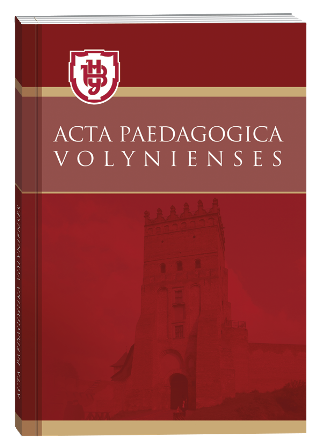USE OF PSYCHOLOGICAL GAMES AND EXERCISES IN THE DAILY ROUTINE (REGIME MOMENTS) IN PRESCHOOL EDUCATION INSTITUTION
DOI:
https://doi.org/10.32782/apv/2025.2.9Keywords:
game competence, game, psychological games/exercises, psychogymnastics, daily routine, regime moments, preschool childrenAbstract
The daily routine or regime moments in preschool education are often a source of pedagogical challenges (decreased motivation, negativism, conflicts) and require scientifically based methods of optimisation. The study of the potential of psychological games in this context is relevant for the development of effective strategies for practical application in the work of the educator, which allow to make the daily routine more interesting, meaningful and contribute to the comprehensive development of the personality of each preschool child. Despite the recognition of the importance of play activities in preschool age, the issue of purposeful use of psychological games in the routine moments remains insufficiently studied. There is a need for a theoretical justification of the effectiveness of such games/exercises in the routine moments in preschool education. Modern preschool education is focused on the humanisation and individualisation of the educational process. Psychological games can become an innovative tool that contributes to the implementation of these principles in the daily practice of preschool education. Research on the impact of daily routines on the development of preschool children shows that a proper routine promotes physical, emotional and social well-being. In particular, it ensures the harmonious development of the nervous system and improves the child's overall health. Playful activity, which arises in the process of complication of human experience, emergence of production and cultural relations and reflects social changes, is social in origin and content. In this activity, preschool children master other types of activities, important new developments occur in the mental and personal spheres, intensive intellectual development of the child takes place, psychological and pedagogical readiness for school is formed. In addition, play activities develop basic qualities of a child's personality, such as independence, initiative, fairness, curiosity, sensitivity, observation, etc.
References
Андрусенко М. П., Балла Л. В. Застосування психогімнастики в аспекті розвитку емоційного інтелекту дошкільників. Науковий вісник Херсонського державного університету. Серія «Психологічні науки», 2016, 2.2: 7–11. URL: surl.li/cuzljg (дата звернення : 29.04.2025).
Базовий компонент дошкільної освіти / Науковий кервівник: Т.О. Піроженко, член-кореспондент НАПН України, д-р псих.наук, проф; Авт. кол-в: Байєр О.М., Безсонова О.К., Брежнєва О.Г., Гавриш Н.В., Загородня Л. П.,Косенчук О. Г., Корнєєва О.Л., Лисенко Г. М., Левінець Н. В., Машовець М.А., Мордоус І.О., Нерянова С. І., Піроженко Т. О., Половіна О. А., Рейпольська О.Д., Шевчук А. С. URL: https://surl.lu/ikhtje (дата звернення: 10.04.2025).
Бєлєнька, Г. В. Вплив ідеї Нової української школи на зміст діяльності педагогів закладів дошкільної освіти Освітній простір України. 2018. № 12. С. 7–14. URL: surl.li/krkwqt (дата звернення : 26.04.2025).
Гаврило, О. І., Гаврило, О. І. Система роботи з успішної адаптації дітей раннього віку в закладі дошкільної освіти. Актуальні питання природничо-математичної освіти. 2020. № 1. С. 12–20. URL: surli.cc/gqtori (дата звернення : 26.04.2025).
Журавко Т. Ігри під час війни для дітей дошкільного віку. URL: https://surl.lu/ukslkx (дата звернення : 27.04.2025).
Журавко Т. В. Психологічна підтримка дітей під час війни. Věda a perspektivy. № 4(11). 2022. С. 177–187. URL: https://surl.li/ntydes (дата звернення : 27.04.2025).
Завязун Т.В. Вплив ігрової діяльності на всебічний розвиток дитини-дошкільника. Науковий часопис НПУ імені М.П. Драгоманова. 2018. Вип. 64. С. 93–96. URL: https://surl.li/unhyja (дата звернення : 26.04.2025).
Калініна Т. С. Психологічна допомога батькам дітей з особливими освітніми потребами в умовах військових дій. Дніпровський науковий часопис публічного управління, психології, права, 2022. Вип. 3. С. 103–107. URL: http://repository.khpa.edu.ua:8080/jspui/bitstream/123456789/2878/1/Kalinina_st.6.pdf (дата звернення : 27.04.2025).
Методичні рекомендації до Базового компонента дошкільної освіти (Державного стандарту дошкільної освіти), 2021. URL: https://surl.lu/odifzw (дата звернення: 10.04.2025).
Рібцун Ю. Психогімнастика. URL: https://surl.li/mnfyuu (дата звернення : 29.04.2025).
Парашкевова С. Психологічні ігри. 2024. URL: https://surl.li/mbeigy (дата звернення : 25.04.2025).
Санітарний регламент для дошкільних навчальних закладів. Наказ Міністерства охорони і здоров’я України № 234 від 24.03.2016. URL: https://zakon.rada.gov.ua/laws/show/z0563-16#n14 (дата звернення: 10.04.2025).







